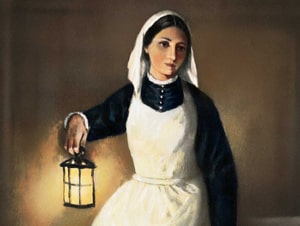Reading practice on Florence Nightingale with a documentary for young learners to improve reading and listening comprehension. Improve your vocabulary in context and listen to any word or phrase in this lesson.
A passion for nursing
Florence Nightingale revolutionized the job of nursing. She cared for sick and wounded British soldiers during the Crimean War (1853-1856), and she saved many lives. Her success in improving nursing care brought her great fame.
Florence Nightingale was born in 1820 to a wealthy English family. She decided in her teens to become a nurse, even though her parents disapproved. At that time, most nurses were from poor families and had little or no training.
But Nightingale was determined to have her way. In 1850 and 1851, she received training at hospitals in Egypt and Germany.
In 1853, Nightingale took charge of a hospital in London, England. Here she showed skills as a nurse and an organizer. She had bells put beside patients’ beds. When patients needed a nurse, they rang their bell. Nobody had thought of this idea before.
The Crimean war
In 1853, Britain, France, and Turkey went to war against Russia. The fighting took place in a part of Russia called the Crimean Peninsula. A newspaper story described how sick and wounded British soldiers were neglected. The British government soon acted. It sent Nightingale and 38 nurses to a military hospital in Turkey. Conditions at the hospital were filthy, and there were few medical supplies and little medical care.
Nightingale organized the hospital. She got bandages and medicines, had drains cleaned, and improved the water supply. Patients were given clean sheets and healthy food. Nightingale became the soldiers’ friend. They called her “the Lady with the Lamp,” after the lantern she carried at night.
After the war
The Crimean War ended in 1856, and Nightingale returned to Britain. She was a national hero, but she disliked all the attention. She saw that many problems remained in health care.
Nightingale devoted the rest of her long life to improving public health and educating people about the importance of good hygiene. Britain’s hospitals accepted her ideas, and they became cleaner, healthier places.
In 1860, Nightingale set up a training school for nurses in London. The “Nightingale nurses,” as its graduates were called, helped spread Nightingale’s ideas around the world. Nightingale died in 1910 at the age of 90.




And I have another question:
What does this sentence mean?
My life flashed before my eyes.
It must refer to someone’s near death experience or NDE when the subject can review their entire life in some flashbacks in a nutshell.
Please provide me with the context as well.
Sure, I saw this phrase in a meme on Instagram.
That is the source. By context, I meant a couple of sentences before and after the intended part so that I could make a more accurate guess on the requested meaning.
Yeah I know that.
It was a video meme, and the only thing that was said, was this.
But your definition to that phrase make sense to that video.
I have gotten the point.
Thank you
Glad I could help!
You’re most welcome.
Hello Dr.Hariri,
I have just finished the reading text, and I came up with some questions about the reading.
1. (Her success in improving nursing care brought her great fame.) In this sentence, don’t we need to put an (a) before ( great fame)?
2.(Nightingale devoted the rest of her long life to improving public health) and here , doesn’t it mean to be like this: (to improve public health), I thought we have to use an infinitive after to.
Hi dear Armaghan,
I would be happy to answer all of your questions here. Don’t hesitate to ask me any question you have.
* Fame is uncountable. It means you cannot count it, e.g. happiness, joy, sadness, and the like.
* This “to” is different from the one used before infinitives. Some further examples:
I don’t object to chewing gums in my class, said the teacher.
Please pay attention to driving and not texting at the steering wheel, said the police officer to the reckless driver.
I devoted, committed, dedicated my life to writing books and teaching online.
Note. In all the above examples, you need to use a gerund or -ing form of a verb after ‘to’ because the part of the sentence after ‘to’ is a noun phrase and it could be substituted for a pronoun like IT.
I devoted my life to it (writing books or teaching online.
Thank you.
I have gotten the point now.
My pleasure. Anytime.
Hello Dr.Hariri ,
I have few question:
1. what does this sentence mean? ( I can remember, wash of that over us.)
2. what is the meaning of this phrase? ( Not in the flesh.)
3. and this one: ( for no reason at all) , what does ( at all ) mean here?
Sure, anytime!
1. wash over someone means to have a strong influence on someone or affect someone noticeably and emotionally. Also depending on the context being used, it might mean that it did not influence us very much and it it didn’t have any deep effect on us.
2. Not in the flash means not in real life or not in person, and conversely, in a film, in a photo or picture, on TV or radio, etc.
3. At all is used to put emphasis on something in a negative way. For no reason at all means: certainly not, not at all.
Thanks for your response.
It’s my pleasure.